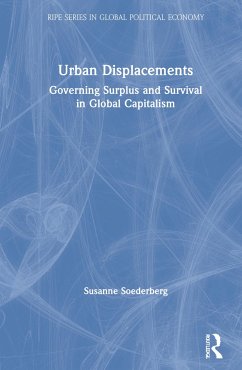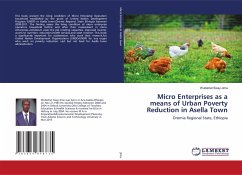WINNER of the BISA IPEG Book Prize 2021 https://www.bisa.ac.uk/members/working-groups/ipeg/articles/ipeg-2021-book-prize-winner-announced With an eye to further our understanding of everyday life in global capitalism, Urban Displacements provides the first systemic critical political economy analysis of low-income rental housing and social dislocations, combining both theoretical advancements and detailed empirical studies, centering on Berlin, Dublin and Vienna. Soederberg pushes beyond dominant debates by treating low-rent housing as a unique commodity that provides a necessary place for the societal reproduction of labour power whilst being integrated into the global dynamics of capitalism. She argues that historical and geographical configurations of monetized governance, including landlords, employers and inter-scalar state practices, have served to reproduce urban displacements and obfuscate their gendered, class and racialized underpinnings. The outcome is the everyday facilitation and normalization of urban poverty and social marginalization on one side, and capital accumulation on the other. Building on Soederberg's previous book Debtfare States and the Poverty Industry, this accessible and interdisciplinary text will be useful to academics and students in political science, sociology, geography, urban studies, labour studies, European studies and gender studies.
Hinweis: Dieser Artikel kann nur an eine deutsche Lieferadresse ausgeliefert werden.
Hinweis: Dieser Artikel kann nur an eine deutsche Lieferadresse ausgeliefert werden.
'Soederberg has successfully captured the complex global ecosystem connecting capitalism, the housing crisis and rising un(der)employment, and delivered it in an accessible, informed package. This book is essential reading for anyone wanting compelling and relevant real-world examples from some of the worst-hit urban centres in the world.'
Leilani Farha, Former UN Special Rapporteur on Adequate Housing and Director of The Shift
'In her newest book, Soederberg revisits the "housing question" famously raised by Engels one and a half centuries ago. Placing today's housing question into the wider class dynamics and contradictions of contemporary global capitalism, the book lays bare the root causes of urban poverty, precarious housing and homelessness in three European cities. With this highly accessible book, once again Soederberg has proven herself as a distinct, most original and radical voice addressing the big social questions of our times.'
Professor Dorothee Bohle, Chair in Social and Political Change at the European University Institute, Italy
'At a time when a dramatic housing crisis prompting massive displacements has exploded in the midst wealthy European cities, a trenchant materialist analysis astutely revealing its underpinning drivers, the class configurations of power, and the concrete, different - yet disturbingly similar - processes governing 21st century poor housing, could not be more topical.'
Professor Margit Mayer, Senior Fellow at the Centre for Metropolitan Studies, Germany
'What is the role of racialised barriers to housing in changing landscapes of accumulation? How does renting become a central process in disuniting working people? This insightful work guides the reader through this most urgent of debates.'
Professor Gargi Bhattacharyya, Centre for Migration, Refugees and Belonging at the University of East London, UK
Leilani Farha, Former UN Special Rapporteur on Adequate Housing and Director of The Shift
'In her newest book, Soederberg revisits the "housing question" famously raised by Engels one and a half centuries ago. Placing today's housing question into the wider class dynamics and contradictions of contemporary global capitalism, the book lays bare the root causes of urban poverty, precarious housing and homelessness in three European cities. With this highly accessible book, once again Soederberg has proven herself as a distinct, most original and radical voice addressing the big social questions of our times.'
Professor Dorothee Bohle, Chair in Social and Political Change at the European University Institute, Italy
'At a time when a dramatic housing crisis prompting massive displacements has exploded in the midst wealthy European cities, a trenchant materialist analysis astutely revealing its underpinning drivers, the class configurations of power, and the concrete, different - yet disturbingly similar - processes governing 21st century poor housing, could not be more topical.'
Professor Margit Mayer, Senior Fellow at the Centre for Metropolitan Studies, Germany
'What is the role of racialised barriers to housing in changing landscapes of accumulation? How does renting become a central process in disuniting working people? This insightful work guides the reader through this most urgent of debates.'
Professor Gargi Bhattacharyya, Centre for Migration, Refugees and Belonging at the University of East London, UK








